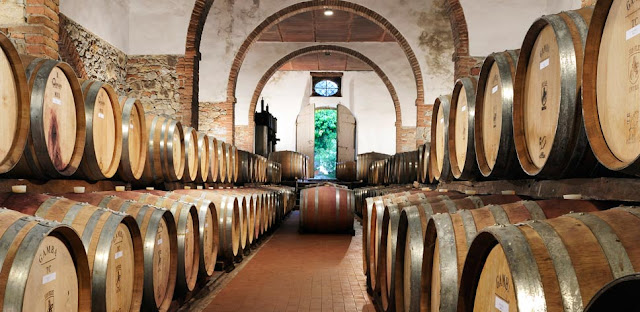“You may have the universe if I may have Italy.” – Giuseppe Verdi
Our last day at our last villa (a
converted monastery). I am exhausted after last night’s Palio abandon (and, in
truth, all the extra walking trying to locate our restaurant around the
bedlam). I tell Barry and the guys to go on without me and I will stay at the
villa. They will be visiting the 12th century village of Radda in
Chianti and finishing with an exhilarating down hill ride of 20 kilometers
through the oak and chestnut forests that cloak the steep hillsides.
I meander around the premises and out into
the olive orchard. The gardener there takes the opportunity to take a break
from his work and tell me about the olive trees. He tells me that the soil,
type of tree grown, amount of sunshine (and for that matter, the amount of
rain) all play a part in determining the flavor of the oil. Each of the
different olive trees (though, to me, they all looked the same) has specific
characteristics. He told me they grow best in clay soil though, actually, they
will grow anywhere but then there is no guarantee of a crop. I told him I love
the olive tree for its sculptural trunk and branches. He said he thought olive
trees are particularly ugly. Ah well, each to their own taste. When I told him
that I would really miss Italy he said that Italians drink a concoction of
olive oil, garlic, and lemon juice in the winter to raise their spirits. I’ll
have to try that.
I wander to the edge of the property and
see the inevitable Cypress trees in the distance. Originally brought to Italy
from Persia by the Etruscans, Cypress trees can live up to 2,000 years. We saw
them everywhere – bordering fields instead of fences, lining the (very long)
driveways up to red-bricked villas, and in strange little copses here and there
where Martin told me the Etruscans had planted them around their sacred burial
sites.
Mid-afternoon and all stills. The birdsong
is less, and a slight breeze moves tree branches – though it is a warm breeze
and offers no relief from the heat. The bell in the old abbey tower chimes two.
A cat lies curled under a bush, and does no more than give a soporific twitch
of his whiskers when the birds hop close. The smell of olive leaves is faint
but close. The villa is surrounded by frangipani, of all colours, and all
sizes, the odour like fresh cut peaches. I take a deep breath, sit back against
an olive tree and think – here I am in Italy, in magical Tuscany surrounded by
the scent of frangipani and jasmine, mourning doves calling and pecking at the
stones at my feet, the swallows (always swallows) swooping and diving and
playing chicken with the top of my head. Earlier in the week, Jesse had told me
about a bright blue/black bee, a kind of carpenter bee. He said it is a
solitary bee, it doesn’t live in hives, but it does the same job – it is a
pollinator. He hoped I would see one. As I sat reading a large object buzzed by
and settled in the lavender. Very large, bright iridescent blue. An Italian
Black Bumble Bee. Gorgeous. So happy I got to see one before leaving Italy.
The guys return from their cycling. Barry
and I go to have a wine tasting at the villa’s own winery. The vintner takes us
out to the vineyard and describes the different varieties and explains their
method of only taking three bunches of grapes off of each plant. He then takes
us through the cellars and talks about his oak barrels (Slovenian oak) and the
methods to obtain different kinds of wine. It is fascinating stuff – and very
complicated. He is also so very, very proud of his wines. It is obvious he
loves his work. We drink some of the wine, stagger back to our room to dress
for dinner.
After dinner we walk back to our room through the night-lit abbey
grounds. Tomorrow we will be taken to Firenze (Florence) to catch our train out
of Italy. A study in people watching and then on to Norway.













No comments:
Post a Comment